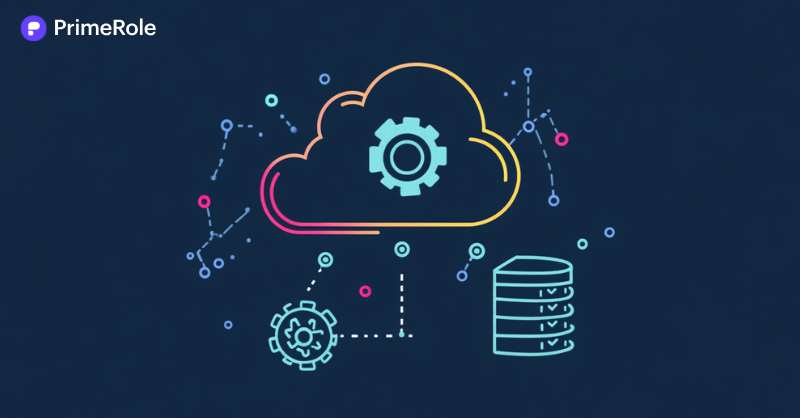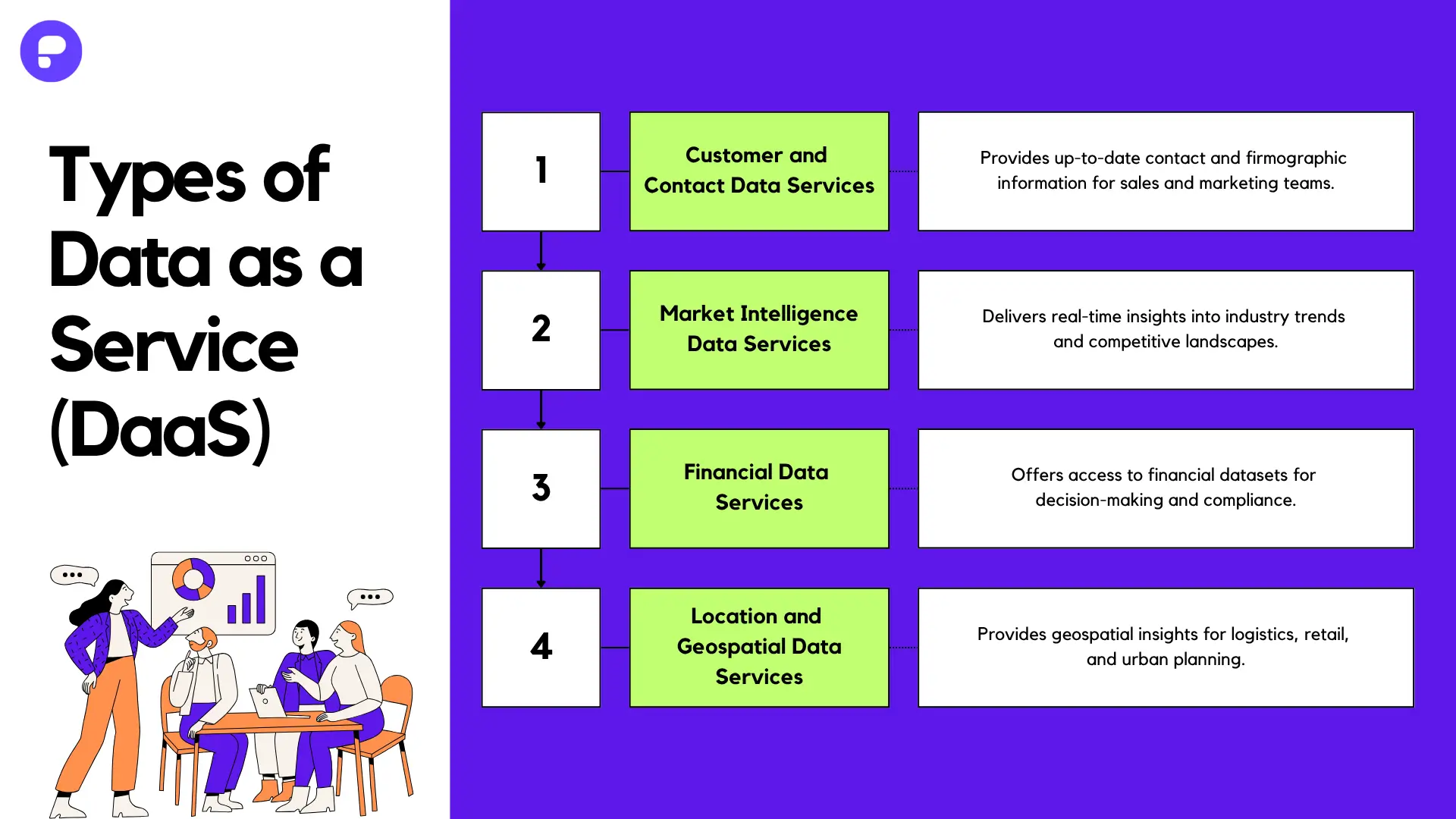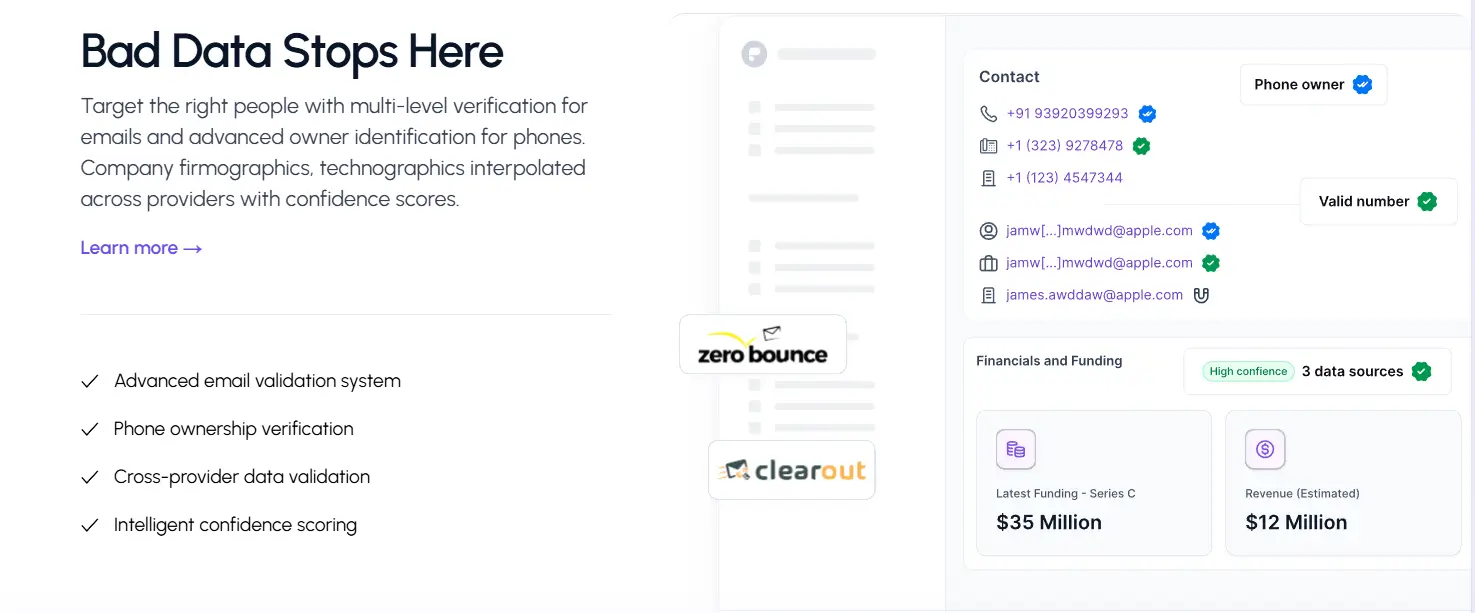
Data is considered one of the most valuable assets for businesses today. According to Edge Delta, 97.2% of businesses are investing in big data and AI technologies to extract actionable insights and drive business growth. However, handling data can be complex, resource-intensive, and costly, especially for businesses with limited IT infrastructure.
Data as a Service allows businesses to access, manage, and analyze data from various sources without the need to maintain expensive infrastructure or dedicate resources to data management. For B2B businesses, adopting DaaS solutions can provide a competitive edge, streamline decision-making, and enhance overall operational efficiency.
In this blog, we’ll explore the definition of DaaS, its benefits, and how B2B companies can leverage it for improved performance.
Table of Contents:
- What is Data as a Service (DaaS)?
- What are the Benefits of Data as a Service (DaaS)?
- How does Data as a Service work?
- Types of Data as a Service (DaaS)
- Effective Ways Businesses Can Utilize Data as a Software (DaaS)
- Challenges of Using Data as a Service (DaaS)
- Conclusion
- Data as a Service (DaaS) Frequently Ask Questions (FAQs)
What is Data as a Service (DaaS)?
Data as a Service (DaaS) is a cloud-based solution that gives businesses access to external or internal data through the internet, typically on a subscription or pay-per-use model. It removes the need to build and manage complex data infrastructure in-house.
Instead of collecting and storing data themselves, companies can pull high-quality, ready-to-use data through APIs or web portals. This means data is always available, up to date, and easy to integrate into existing systems like CRMs, analytics tools, or customer platforms.
DaaS helps organizations stay agile by providing the data they need, exactly when they need it, whether for sales, marketing, finance, or operations. It’s a smarter way to handle data without the overhead of traditional storage and maintenance.
What are the Benefits of Data as a Service (DaaS)?
Data as a Service (DaaS) has emerged as a game changer for businesses seeking to exploit data without infrastructure management challenges. Businesses may now get high-quality data on demand from cloud-based platforms, rather than constructing sophisticated systems in-house.
DaaS has practical and strategic advantages, including cost savings and increased scalability. It gives b2b businesses the knowledge and flexibility they need to stay competitive. Let’s take a deeper look at the main benefits of Data as a Service:
1. Cost Efficiency
One of the most significant benefits of using data as a service is the potential to reduce costs significantly. Traditional data storage and management systems require a large investment in infrastructure, software licenses, maintenance, and IT personnel.
With DaaS, businesses pay only for the data they use, usually through a subscription or usage-based pricing model. This eliminates upfront capital expenditures and reduces operational costs, allowing companies to allocate their budgets more effectively.
2. Scalability and Flexibility
Data as a service solution offers unmatched scalability. As your business grows or your data needs change, DaaS platforms can scale with you. There’s no need to upgrade hardware, reconfigure systems, or worry about storage capacity.
This flexibility enables companies to adapt quickly to new projects, market conditions, or internal demands. Whether your data usage increases temporarily or continuously, DaaS allows you to scale resources up or down with minimal friction.
3. Access to High-Quality Data
A major benefit of DaaS is the ability to access clean, enriched, and accurate data. Most data as a service platforms handle the processes of validation, deduplication, and normalization, ensuring you receive reliable datasets that are ready to use.
High-quality data supports more accurate analysis, better forecasting, and smarter business decisions. Instead of spending time fixing or validating raw data, teams can focus on extracting insights and driving results.
4. Seamless Integration with Business Systems
A data-as-a-service platform is built for interoperability. It typically offers robust APIs and connectors that make integrating data into an existing technology stack, such as a CRM, marketing automation tool, analytics dashboard, or ERP system, easy.
This streamlined access to data across departments encourages data-driven decision-making and ensures consistency across business operations. Teams can access the same version of the truth, reducing silos and improving collaboration.
5. Improved Data Security and Compliance
Security is a top priority in today’s data landscape, and Data as a Service solutions provider is equipped to handle it. These platforms often include advanced security protocols such as encryption, access control, and continuous monitoring to protect sensitive data.
In addition, many DaaS solutions are built with compliance in mind, supporting standards like GDPR, HIPAA, and CCPA. Businesses benefit from enterprise-grade security infrastructure without needing to manage it internally.
6. Faster Decision-Making
With real-time access to trusted data, DaaS empowers teams to act quickly and confidently. Instead of waiting for internal teams to gather, clean, and deliver data, users can access insights instantly through dashboards, reports, or embedded applications.
This speed improves responsiveness across all departments, from marketing and sales to finance and operations, driving better outcomes overall.
7. Centralized Data Management
DaaS allows businesses to unify their data sources through a single platform, simplifying management and governance. Instead of dealing with multiple systems and data silos, teams can work from a centralized hub that ensures consistency and control.
This centralized approach reduces redundancy, improves data accuracy, and simplifies audits and reporting processes.
How does Data as a Service work?
Data as a Service simplifies how businesses access and use data by removing the need for on-premises infrastructure. It operates entirely through the cloud and delivers data through secure, user-friendly channels like APIs.
Here’s a breakdown of how Data as a Service works:
-
Cloud-Based Delivery Model: Data as a Service works entirely in the cloud. All data is stored, managed, and processed on remote servers maintained by the DaaS provider. This eliminates the need for businesses to invest in physical infrastructure or worry about system maintenance.
-
API-Driven Access: Businesses interact with DaaS platforms via secure APIs (Application Programming Interfaces). These APIs allow users to quickly pull the specific data they need and integrate it into internal systems, analytics tools, or applications without complex setup.
-
Real-Time and On-Demand Data: One of the key features of DaaS is access to real-time and updated data. Whether you need current market data, customer behavior trends, or operational metrics, It ensures that you always have the most accurate and relevant information.
-
Supports Various Data Types: DaaS platforms can handle a wide range of data formats, including structured, unstructured, transactional, and streaming data. This versatility makes them suitable for many departments, including marketing, finance, operations, and more.
-
Seamless Integration and Scalability: With a service-oriented architecture, DaaS integrates easily into existing business workflows. It also scales effortlessly as your data needs grow, allowing you to expand usage without performance issues or added infrastructure costs.
Types of Data as a Service (DaaS)
Data as a Service isn’t a single solution; it comes in various specialized forms depending on the type of data businesses need to access. Each type is designed to solve different operational challenges, whether that’s customer outreach, market analysis, financial planning, or logistics.
Here are key types of Data as a Service (DaaS) platforms that businesses use to gain a competitive edge:

Customer and Contact Data Services
Customer and Contact Data Services give sales, marketing, and customer success teams instant access to up-to-date contact and firmographic information. These platforms aggregate data from multiple sources and make it easily searchable through clean, user-friendly interfaces or APIs. Whether you're looking for decision-makers in a particular industry or need detailed company profiles, this type of DaaS delivers actionable insights on demand.
PrimeRole is a great data as a service example in this space. As a B2B sales intelligence platform, It helps businesses discover verified contacts, filter by roles, industries, or company size, and integrate that data directly into their outreach and automation tools. This eliminates the need for manual list building and speeds up go-to-market efforts.
Key benefits of Customer and Contact DaaS include:
- Streamlined lead generation and targeting
- Improved personalization in outreach campaigns
- Accurate segmentation for audience-specific messaging
By eliminating manual data collection and outdated contact lists, businesses can run more efficient campaigns and close deals faster.

Drive More Revenue with Verified B2B Data
Boost pipeline performance with PrimeRole’s multi-source enrichment and real-time contact intelligence.
Market Intelligence Data Services
Market Intelligence DaaS focuses on delivering real-time insights into industry trends, customer behavior, and competitive landscapes. With this service, businesses can stay ahead of market shifts and better understand the external forces influencing their industry. It pulls in data from news sources, social media, public reports, and market analysts to offer a comprehensive view of what’s happening in real time.
Benefits of Market Intelligence DaaS include:
- Data-driven product development
- Smarter pricing and positioning strategies
- Enhanced risk assessment and forecasting
For product managers, strategy teams, and executive leadership, Market Intelligence DaaS is crucial for making forward-thinking decisions rooted in current and reliable data.
Financial Data Services
Financial Data as a Service offers access to a wide range of financial datasets, such as stock prices, investment performance, economic indicators, and historical financial records. These services are especially useful in sectors like banking, insurance, and asset management, where timely and accurate financial data is essential for decision-making and compliance.
Financial DaaS platforms help businesses:
- Improve financial forecasting and modeling
- Monitor investment performance
- Ensure compliance with evolving financial regulations
Instead of managing internal finance databases, companies can rely on a DaaS solution to provide clean, up-to-date numbers in a secure environment.
Location and Geospatial Data Services
Location Data Services deliver geospatial insights that are essential for businesses in logistics, retail, transportation, and urban planning. By using this DaaS type, companies can analyse traffic patterns, customer footfall, delivery zones, and asset locations. The data often comes from GPS systems, satellite imagery, mobile apps, and IoT devices.
Here are Key benefits include:
- Optimised route planning for logistics
- Data-driven site selection for retail
- Better urban infrastructure planning
Location DaaS helps turn geographic data into business opportunities, allowing companies to make smarter decisions tied to physical space and movement.
Effective Ways Businesses Can Utilize Data as a Software (DaaS)
Data as a Service (DaaS) isn’t just about access; it’s about impact. Companies across sectors are leveraging DaaS to improve decision-making, streamline operations, and outpace competitors.
Below are some focused use cases that show exactly how businesses apply DaaS in day-to-day operations.
1. Account-Based Marketing (ABM)
In account-based marketing, precision targeting is everything. Data as a Service enables ABM teams to enrich their account profiles with real-time firmographic and technographic data, making campaign personalization far more effective. By integrating DaaS into their marketing stack, businesses gain access to high-value intent signals and company-level insights, helping them prioritize the right accounts.
This enhanced visibility leads to better engagement and higher ROI across campaigns. Companies can segment key accounts more intelligently and automate parts of the outreach process using data that’s continuously updated via APIs.
Anticipate Customer Needs At The Right Time
Use PrimeRole to enrich target accounts with firmographic, technographic, and intent data in real time.
2. Lead Scoring and Qualification
Effective lead scoring depends on complete and up-to-date information. DaaS platforms help sales teams enrich data by adding key attributes such as company size, job title, purchase intent, and engagement history. This enrichment process is automated and seamlessly integrates with existing CRM systems.
With enriched data available in real time, sales reps can prioritize leads based on actual buying signals rather than relying on guesswork. This reduces time spent on manual research, increases conversion potential, and improves overall pipeline efficiency. Leveraging DaaS for lead qualification transforms sales workflows into more precise, data-driven processes.
3. Customer Segmentation
Segmentation is more powerful when it’s driven by real-time, contextual data. DaaS allows marketers to move beyond basic segmentation by delivering datasets that reflect behavioral patterns, product usage, or industry-specific needs. This empowers brands to build precise audience segments that align with actual customer behavior.
Whether you’re running email marketing, tailoring product offers, or optimizing your website experience, segmented insights from DaaS make each interaction more relevant. Over time, this leads to increased engagement, lower churn, and better conversion metrics.
4. Competitive Intelligence
In competitive markets, having real-time insights into your rivals is a strategic advantage. DaaS providers offer data on competitor web traffic, pricing updates, campaign tactics, and even hiring trends. By tapping into these insights, teams can spot opportunities, monitor shifts in positioning, and proactively respond to market changes.
This makes competitive intelligence a prime data as a service example that helps organizations stay agile and informed. DaaS transforms scattered data points into a unified view of the competitive landscape, something spreadsheets and static reports can’t keep up with.
5. Fraud Detection and Risk Mitigation
DaaS plays a critical role in identifying and preventing fraud, especially in sectors like fintech, insurance, and e-commerce. Businesses can detect anomalies in real time by pulling transactional and behavioral data into a centralized analytics system.
DaaS solutions often include predictive modeling and machine learning that flag suspicious activity before it becomes a bigger issue. The flexibility of cloud-based DaaS also means companies can scale these protections as data volumes grow, keeping their systems secure without overloading internal teams.
Challenges of Using Data as a Service (DaaS)
While Data as a Service offers incredible flexibility and power, it’s not without its hurdles. Like any technology, success depends on adoption, implementation, integration, and governance. Below are the most common challenges B2B teams face when using DaaS and ways to overcome them.
1. Data Decay and Quality Issues
Even the most reliable DaaS providers can’t entirely prevent data from becoming outdated. People change jobs, companies get acquired, and contact details shift frequently. According to Businesses.com, research shows that B2B data decays at a rate of up to 30% per year.
This decay can lead to:
- Bounced emails and failed campaigns.
- Sales teams wasting time on outdated leads.
- Poor personalization and missed opportunities.
Opt for a DaaS platform that offers real-time updates, continuous enrichment, and multi-source validation to reduce inaccuracies. Platforms using waterfall enrichment, which involves layering multiple providers, tend to offer fresher and more reliable data.
2. Integration Complexity
Most DaaS platforms claim to “plug and play” with popular tools like Salesforce, HubSpot, or Snowflake. But in reality, integration can be complex, especially when custom workflows, legacy systems, or internal APIs are involved.
Some integration challenges include:
- Inconsistent data formatting.
- API limitations or rate limits.
- Internal resistance from IT or operations teams.
Choose a DaaS provider with proven integrations for your tech stack and strong technical documentation. Involve RevOps or IT early in the buying process to ensure alignment on integration capabilities and infrastructure readiness.
3. Privacy and Compliance Concerns
With growing data privacy regulations like GDPR, CCPA, and others, using third-party contact data requires caution. Mishandling personal information, even unintentionally, can lead to legal trouble, fines, and brand damage.
Key compliance concerns include:
- Whether consent has been obtained.
- How data is stored, processed, and transferred.
- Whether the data provider is transparent about sources.
Only partner with Data as a service (DaaS) companies that demonstrate regulatory compliance, have a clear privacy policy, and offer data provenance transparency. Ask about their data sources and ensure you have internal policies in place for ethical data use.
4. Cost Overruns and Budget Spikes
Many DaaS platforms operate on usage-based pricing, charging per API call, record pull, or credit used. While flexible, this model can lead to cost overruns if not monitored carefully. Problems arise when:
- Multiple teams access the platform without oversight.
- No usage thresholds or alerts are set.
- Growth in usage isn’t aligned with budget planning.
Monitor usage through detailed reporting dashboards, set limits or approval workflows, and align cross-functional usage expectations. Some vendors also offer flat-rate pricing tiers for predictable budgeting.
Conclusion
Data as a Service is more than a buzzword. It’s a game-changer for modern B2B organizations. Whether you're trying to streamline your go-to-market strategy, improve targeting, or enhance decision-making, DaaS gives you the fuel to move faster and smarter.
But like any tool, the real value comes from choosing the right provider. Not all DaaS platforms are created equal. The best solutions combine accuracy, scalability, and seamless integration with your existing systems.
PrimeRole delivers multi-source, waterfall-enriched data that’s always fresh, reliable, and ready to drive results. Whether you enrich lead data, identify ICP accounts, or activate real-time buyer intent, It helps your teams move from data to decisions faster.
DaaS offers clarity, control, and a competitive advantage in a world drowning in data. Don’t just collect data. Use it with purpose. And if you're ready to elevate your B2B data strategy, consider PrimeRole as your trusted DaaS partner.
Data as a Service (DaaS) Frequently Ask Questions (FAQs)
What do you mean by data as a service?
Data as a Service (DaaS) is a cloud-based model that delivers data on demand through APIs or dashboards. It allows businesses to access, manage, and analyze data without building or maintaining complex infrastructure, improving flexibility, speed, and decision-making.
Who uses Data as a Service?
DaaS is used by businesses across industries such as marketing teams, sales departments, financial analysts, supply chain managers, and healthcare providers. They rely on enriched, real-time data to support insights, automation, and strategic planning.
What is the difference between SaaS and data as a service?
SaaS provides software applications over the cloud, while DaaS specifically delivers data as the main product. SaaS tools may include data features, but DaaS focuses on supplying raw or processed data that businesses can use within any application or system.
What are some examples of Data as a Service?
Examples of DaaS include lead enrichment tools, real-time stock market feeds, location intelligence platforms, and customer segmentation datasets. Businesses use these services to gain insights, improve targeting, and enhance operational efficiency without managing the underlying data sources.
